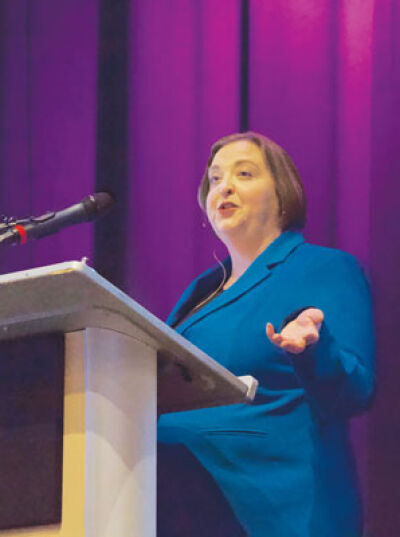
Warren Mayor Lori Stone delivered her proposed city budget for the 2025-2026 fiscal year at the Warren Community Center on April 14.
Photo by Nick Powers
WARREN — Warren Mayor Lori Stone stepped up to the lectern at the Warren Community Center on April 14 to present her hopes for the 2026 budget.
“Going into 2024, we can all agree that Warren’s elected leadership inherited a bit of a dysfunctional budget process,” Stone said. “Together, we worked really hard to rebuild trust, mutual respect and successfully restored this process.”
Stone laid out themes for the budget: fiscal responsibility, addressing aging infrastructure, respecting the hard work of city employees and getting additional grant funding for city projects.
Infrastructure
Stone said the city’s wastewater incinerator was at the “end of its life.” She said the incinerator has been taken offline three times since she took office in November 2023. The city has been looking into replacements.
“They discovered state-of-the-art, next-generation incineration technology that will
improve upon our already excellent air quality, recycle the heat energy used during the drying and incineration process and have the potential to prove the destruction of low levels of PFAs in our wastewater,” Stone said. “With this technology Warren will be on the cutting edge.”
Stone explained that the project started receiving funding last year with increased water and sewer rates. The price tag for estimated updates to the city’s Water Recovery Facility, formerly the Warren Waste Water Treatment Plant, total $83.5 million. The city obtained a loan through the Michigan Department of Environment, Great Lakes, and Energy, totaling approximately $75 million at a 2% interest rate. Of that total amount, $10 million is forgivable.
Stone touted the recently opened 21.5-million-gallon detention basin on Stephens Road, between Gratiot Avenue and Groesbeck Highway.
“It definitely helped manage this last rain occurrence,” Stone said.
She said she hoped to see the Eckstein Skate Park, the splash pad at Wiegand Park and updates to the Warren Community Center. The Warren Community Center’s parking lot could get a $4 million update. She also stressed the importance of technology improvements, aiming to add an online hiring portal and making the city’s website more accessible.
The mayor proposed $16.9 million for road improvements. The projects include Martin Road from Ryan Road to David Givens Street, Hayes from Martin Road to Rudland Street, Audrey Avenue from Nine Mile to Hudson Avenue, Cunningham from Nine Mile to Stephens Road, Sherwood Avenue from Toepfer Road to Nine Mile Road, Haverhill Drive from Interstate 696 to McKinley Road and Cyman Avenue from Toepfer Road to Nine Mile. Additionally, $8.6 million of the proposed budget is carved out for water main replacements.
Water and sewer rates are set to increase by 5.78%, which Stone said is almost 2% less than last year’s increase.
“We’ve seen that failing to adequately fund infrastructure is what results in community catastrophes like Flint,” Stone said.
Opioid settlement
A multibillion-dollar settlement gave municipalities nationwide funding to address negative impacts of opioids.
“The opioid settlements refer to offers from opioid manufacturers, distributors, and pharmacies to settle various lawsuits against their companies across the U.S.,” the state of Michigan website states. “Some states, including Michigan, will also receive settlement funds from local pharmacies.”
The majority of the funds must be used for opioid remediation, the website states.
The mayor said the city had $2,409,481 available from the settlement. Rather than spending all the money up front, Stone wants to endow the money so it’ll continue to perpetually provide for residents. She cited what Florida did with dollars from its settlement with the tobacco industry.
“Instead of spending it down, they endowed it,” Stone said. “That means they invested it, and they only spent the interest that had accrued.”
Stone wants Warren to use the funds similarly.
“This is a proposal I’m anxious to bring and share now we are prepared to move forward with the process of committing our funds,” she said. “Let’s do it in a smarter way that makes it work for Warren.”
The numbers
The mayor’s budget put total expenditures for 2026 at $430,524,301. The largest slice of that pie was the general fund at 48.2%. The next largest, at 24.2%, is the special revenue fund, followed by enterprise at 23.2%. The total requested by department heads for the 2026 year was $177.7 million. Stone whittled that down to about $159.7 million.
Stone expects to pull in $159,699,017 in general fund revenue. Just over 57% of that comes from property taxes. The next largest source is intergovernmental revenues at 21.7%. Stone projects that state revenue sharing will continue to increase, following the upward trend since 2020.
The general fund expenditures, at $159,699,017, are mostly eaten up by police and fire costs. Public safety accounts for about 62% of the expenditures. Stone mentioned that the key to maintaining quality public services is renewal of the Police & Fire Public Safety Millage that’s on the Aug. 5 ballot.
“Warren’s spending on public safety is in alignment with our commitment to keep
Warren a safe place to live,” Stone said.
Stone said the city’s Fire Department is “fully staffed.” She highlighted the 34 police officers that have been hired since she took office.
However, the Police Department is short on employees. Warren City Councilman Dave Dwyer said at the council’s March 25 meeting that the department was short 25 officers.
“We are not currently advertising anywhere, so we’re just crawling along,” Dwyer said. “We’ve got three that have applied in the last hiring cycle. We have four that are being hired in early April, but then we got two officers that are retiring in June. We’re just not making a lot of progress here.”
According to Stone, most general fund expenditures are wages and fringe benefits. She showed that over 50% of employees are involved in public safety.
Pension funding for general government employees and police and fire are both above the 60% recommended by the state. Funding for general government employees is at 75.6% and police and fire is at 63.1%.
Now that Stone has laid out her vision, it’s the City Council’s turn to consider it. The council will hold hearings April 26, April 28 and, if necessary, April 29. Adoption of the city’s budget is on the council’s May 13 agenda. All the meetings are open to the public. Stone encouraged residents to get involved in the process.
“Citizenship goes beyond casting a vote at a ballot box,” she said. “Democracy demands actively holding elected officials accountable by participating.”
 Publication select ▼
Publication select ▼


























